Resolution on Waqf Passed in the Joint meeting of the General Body and National Executive held on 27 September-2025 at New Delhi
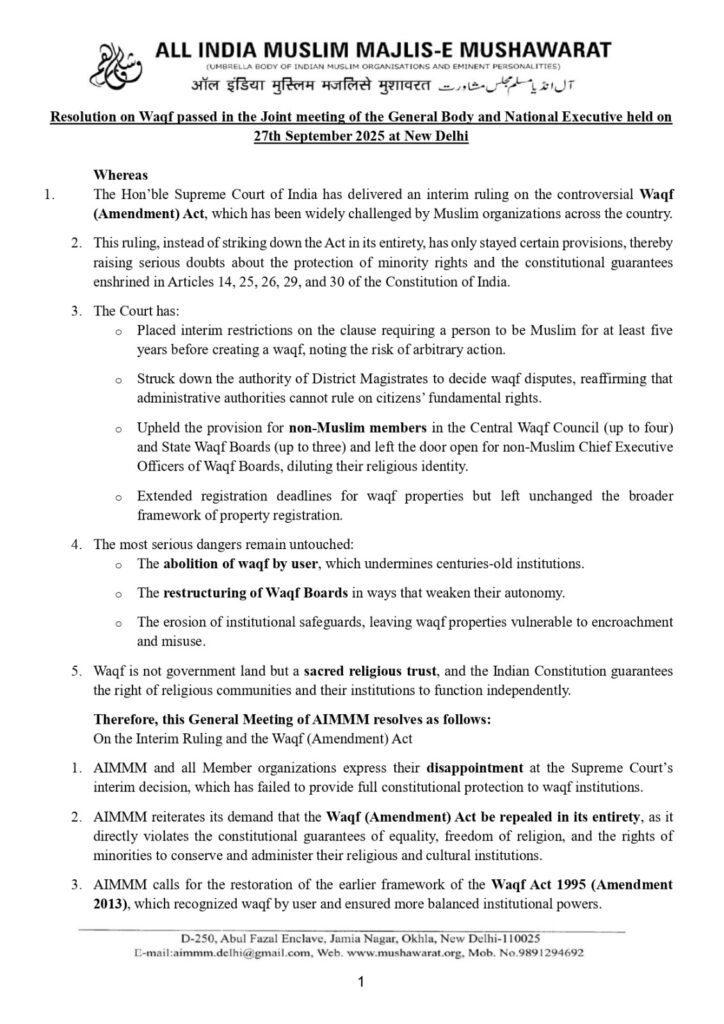
Whereas Therefore, this General Meeting of AIMMM resolves as follows: On the Interim Ruling and the Waqf (Amendment) Act On Protection and Empowerment of Waqf Boards On Constitutional Safeguards and Minority Rights Concluding operative: This General Meeting declares that the struggle to safeguard waqf is not only about property but about the religious identity, cultural survival, and constitutional rights of the Muslim community in India. AIMMM, in unity with all Muslim organizations, resolves to continue its peaceful, democratic, and legal struggle until the Waqf (Amendment) Act is repealed and a framework is established that truly protects the sanctity, autonomy, and survival of waqf in India. Proposed by: Mr. Feroze Ahmad (Advocate), President, AIMMM
Resolution on Special Intensive Revision (SIR) of Electoral Rolls Passed in the Joint meeting of the General Body and National Executive held on 27 September-2025 at New Delhi
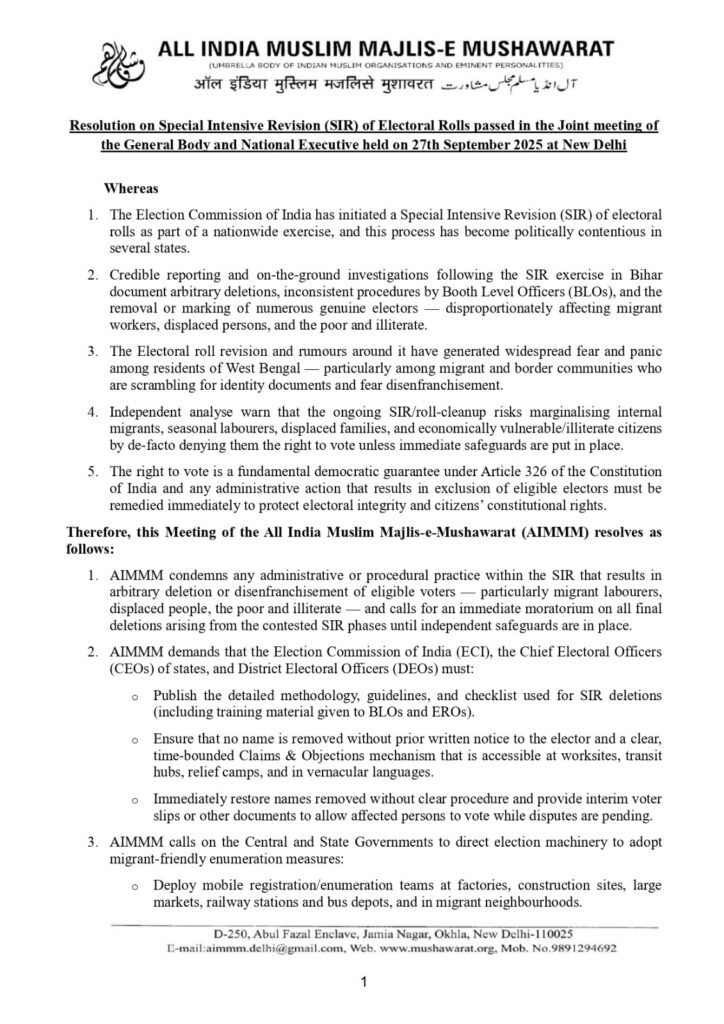
Whereas Therefore, this Meeting of the All India Muslim Majlis-e-Mushawarat (AIMMM) resolves as follows: Resolved — Political action & solidarity: Conclusion This Meeting asserts that democracy is measured by the breadth of participation — not by administrative purging of voters — and AIMMM pledges to defend the constitutional right to franchise for every eligible citizen, with special focus on migrants, displaced persons, poor and illiterate communities who are at heightened risk during SIR exercises. Proposed by: Mr. Ahmed Jawed, General Secretary (Media), AIMMM
Resolution on Jammu & Kashmir and Ladakh Passed in the Joint meeting of the General Body and National Executive held on 27 September-2025 at New Delhi
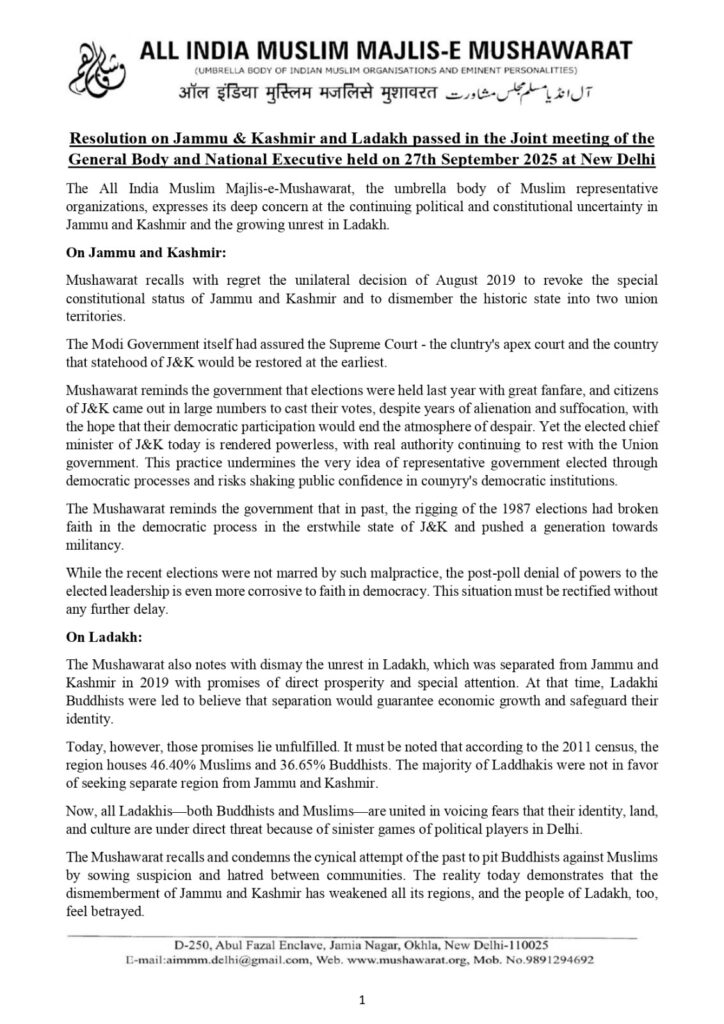
The All India Muslim Majlis-e-Mushawarat, the umbrella body of Muslim representative organizations, expresses its deep concern at the continuing political and constitutional uncertainty in Jammu and Kashmir and the growing unrest in Ladakh. On Jammu and Kashmir: Mushawarat recalls with regret the unilateral decision of August 2019 to revoke the special constitutional status of Jammu and Kashmir and to dismember the historic state into two union territories. The Modi Government itself had assured the Supreme Court – the cluntry’s apex court and the country that statehood of J&K would be restored at the earliest. Mushawarat reminds the government that elections were held last year with great fanfare, and citizens of J&K came out in large numbers to cast their votes, despite years of alienation and suffocation, with the hope that their democratic participation would end the atmosphere of despair. Yet the elected chief minister of J&K today is rendered powerless, with real authority continuing to rest with the Union government. This practice undermines the very idea of representative government elected through democratic processes and risks shaking public confidence in counyry’s democratic institutions. The Mushawarat reminds the government that in past, the rigging of the 1987 elections had broken faith in the democratic process in the erstwhile state of J&K and pushed a generation towards militancy. While the recent elections were not marred by such malpractice, the post-poll denial of powers to the elected leadership is even more corrosive to faith in democracy. This situation must be rectified without any further delay. On Ladakh: The Mushawarat also notes with dismay the unrest in Ladakh, which was separated from Jammu and Kashmir in 2019 with promises of direct prosperity and special attention. At that time, Ladakhi Buddhists were led to believe that separation would guarantee economic growth and safeguard their identity. Today, however, those promises lie unfulfilled. It must be noted that according to the 2011 census, the region houses 46.40% Muslims and 36.65% Buddhists. The majority of Laddhakis were not in favor of seeking separate region from Jammu and Kashmir. Now, all Ladakhis—both Buddhists and Muslims—are united in voicing fears that their identity, land, and culture are under direct threat because of sinister games of political players in Delhi. The Mushawarat recalls and condemns the cynical attempt of the past to pit Buddhists against Muslims by sowing suspicion and hatred between communities. The reality today demonstrates that the dismemberment of Jammu and Kashmir has weakened all its regions, and the people of Ladakh, too, feel betrayed. Therefore, in light of the unfortunate developments mentioned above, the All India Muslim Majlis-e-Mushawarat demands: The Mushawarat reiterates that lasting peace in the region can only be secured through restoring trust, respecting democratic promises, and ensuring justice for all communities of Jammu, Kashmir, and Ladakh. Proposed byNavaid Hamid, Working President of AIMMM with inputs from Iftekhar Gilani – Member AIMMM and senior journalist.
Resolution on Police Action in Bareilly and House Arrest of Maulana Tauqir Raza Khan Passed in the Joint meeting of the General Body and National Executive held on 27 September-2025 at New Delhi
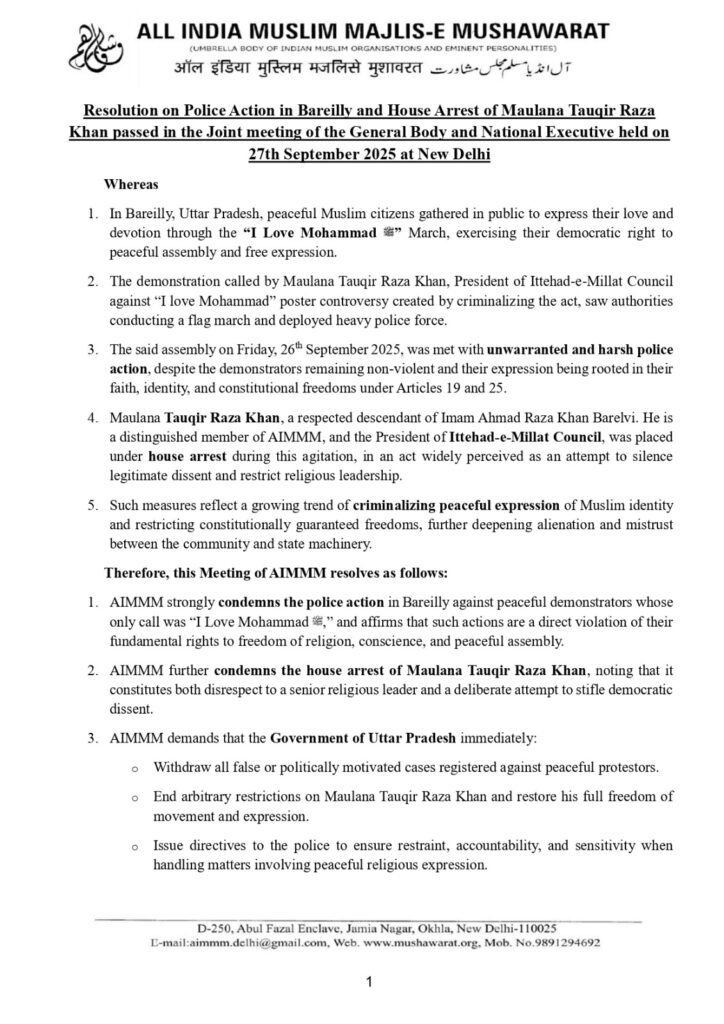
Whereas Therefore, this Meeting of AIMMM resolves as follows: Conclusion This General Meeting declares that AIMMM will continue to stand by its member organizations, community leaders, and the common people in their democratic struggles, and will not remain silent in the face of police excesses and arbitrary restrictions on religious expression. AIMMM pledges to pursue democratic, legal, and constitutional avenues to ensure justice in this matter. Proposed by Mr. Ahmed Jawed, General Secretary (Media), AIMMM
Resolution on Afghanistan Passed in the Joint meeting of the General Body and National Executive held on 27 September-2025 at New Delhi
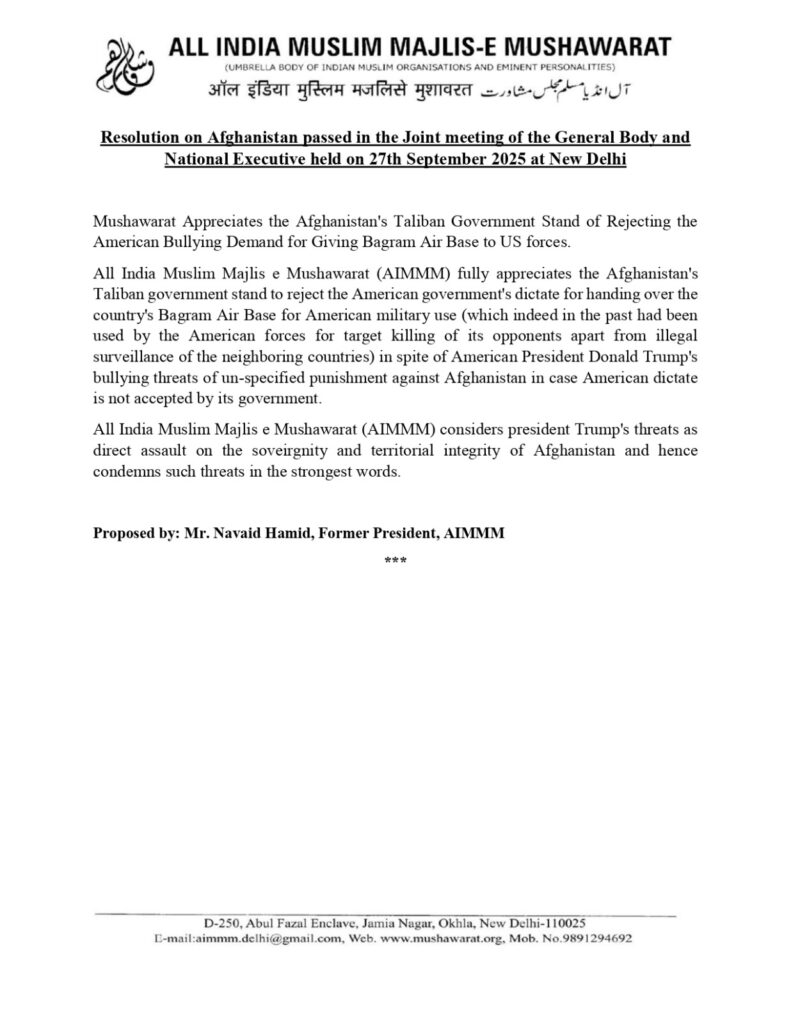
Mushawarat Appreciates the Afghanistan’s Taliban Government Stand of Rejecting the American Bullying Demand for Giving Bagram Air Base to US forces. All India Muslim Majlis e Mushawarat (AIMMM) fully apricates the Afghanistan’s Taliban government stand to reject the American government’s dictate for handing over the country’s Bagram Air Base for American military use (which indeed in the past had been used by the American forces for target killing of its opponents apart from illegal surveillance of the neighboring countries) in spite of American President Donald Trump’s bullying threats of un-specified punishment against Afghanistan in case American dictate is not accepted by its government. All India Muslim Majlis e Mushawarat (AIMMM) considers president Trump’s threats as direct assault on the soveirgnity and territorial integrity of Afghanistan and hence condemns such threats in the strongest words. Proposed by: Mr. Navaid Hamid, Former President, AIMMM
Resolution on Denial of Bail to Delhi ‘s North East Riots Case Passed in the Joint meeting of the General Body and National Executive held on 27 September 2025 at New Delhi
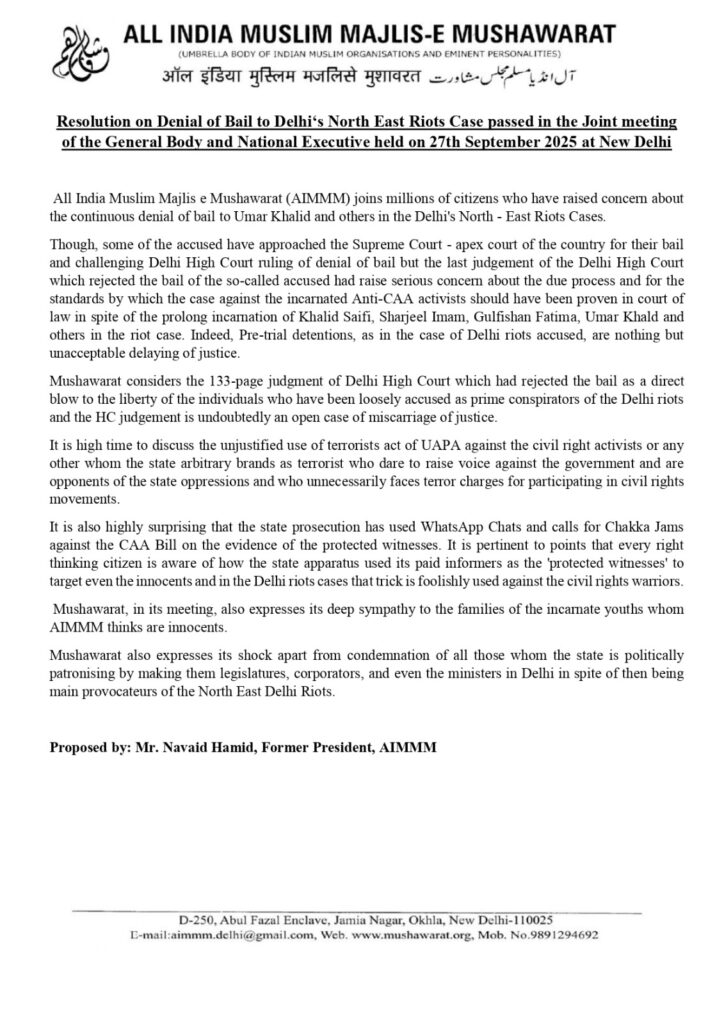
All India Muslim Majlis e Mushawarat (AIMMM) joins millions of citizens who have raised concern about the continuous denial of bail to Umar Khalid and others in the Delhi’s North – East Riots Cases. Though, some of the accused have approached the Supreme Court – apex court of the country for their bail and challenging Delhi High Court ruling of denial of bail but the last judgement of the Delhi High Court which rejected the bail of the so-called accused had raise serious concern about the due process and for the standards by which the case against the incarnated Anti-CAA activists should have been proven in court of law in spite of the prolong incarnation of Khalid Saifi, Sharjeel Imam, Gulfishan Fatima, Umar Khald and others in the riot case. Indeed, Pre-trial detentions, as in the case of Delhi riots accused, are nothing but unacceptable delaying of justice. Mushawarat considers the 133-page judgment of Delhi High Court which had rejected the bail as a direct blow to the liberty of the individuals who have been loosely accused as prime conspirators of the Delhi riots and the HC judgement is undoubtedly an open case of miscarriage of justice. It is high time to discuss the unjustified use of terrorists act of UAPA against the civil right activists or any other whom the state arbitrary brands as terrorist who dare to raise voice against the government and are opponents of the state oppressions and who unnecessarily faces terror charges for participating in civil rights movements. It is also highly surprising that the state prosecution has used WhatsApp Chats and calls for Chakka Jams against the CAA Bill on the evidence of the protected witnesses. It is pertinent to points that every right-thinking citizen is aware of how the state apparatus used its paid informers as the ‘protected witnesses’ to target even the innocents and in the Delhi riots cases that trick is foolishly used against the civil rights warriors. Mushawarat, in its meeting, also expresses its deep sympathy to the families of the incarnate youths whom AIMMM thinks are innocents. Mushawarat also expresses its shock apart from condemnation of all those whom the state is politically patronising by making them legislatures, corporators, and even the ministers in Delhi in spite of then being main provocateurs of the North East Delhi Riots. Proposed by: Mr. Navaid Hamid, Former President, AIMMM
حلقہ بندی کے عمل پر قرارداد
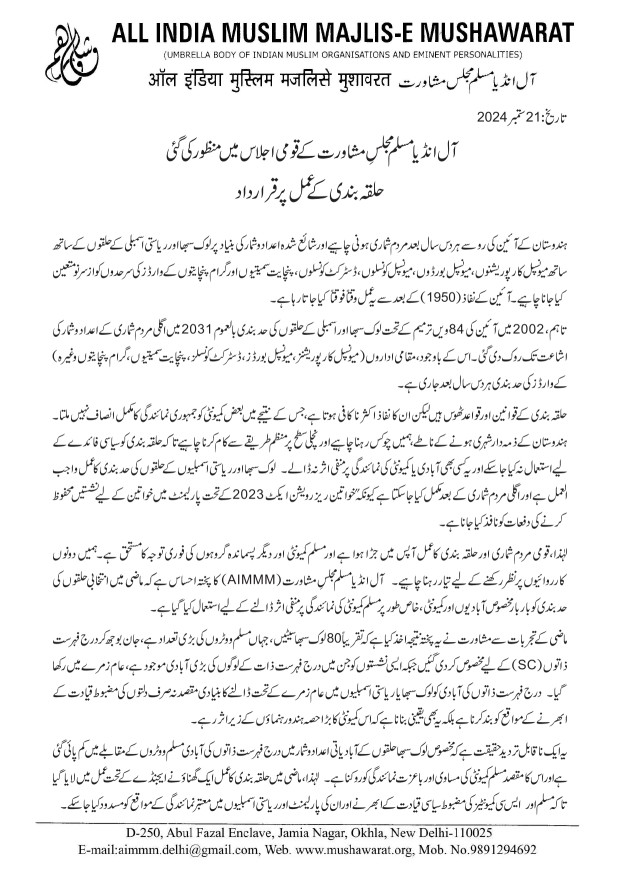
آل انڈیا مسلم مجلسِ مشاورت کے قومی اجلاس میں منظور کی گئی تاریخ:21 ستمبر2024 ہندوستان کے آئین کی رو سے ہر دس سال بعد مردم شماری ہونی چاہیے اور شائع شدہ اعداد و شمار کی بنیاد پر لوک سبھا اور ریاستی اسمبلی کے حلقوں کے ساتھ ساتھ میونسپل کارپوریشنوں، میونسپل بورڈوں، میونسپل کونسلوں، ڈسٹرکٹ کونسلوں، پنچایت سمیتیوں اور گرام پنچایتوں کے وارڈز کی سرحدوں کو ازسرنو متعین کیا جانا چاہیے۔ آئین کے نفاذ(1950 ) کے بعد سے یہ عمل وقتاً فوقتاً کیا جاتارہا ہے۔ تاہم، 2002 میں آئین کی 84ویں ترمیم کے تحت لوک سبھا اور اسمبلی کے حلقوں کی حد بندی بالعموم 2031 میںاگلی مردم شماری کے اعداد و شمار کی اشاعت تک روک دی گئی۔ اس کے باوجود، مقامی اداروں (میونسپل کارپوریشنز، میونسپل بورڈز، ڈسٹرکٹ کونسلز، پنچایت سمیتیوں، گرام پنچایتوں وغیرہ) کے وارڈز کی حد بندی ہر دس سال بعد جاری ہے۔ حلقہ بندی کے قوانین اور قواعد ٹھوس ہیں لیکن ان کا نفاذ اکثر ناکافی ہوتا ہے، جس کے نتیجے میں بعض کمیونٹی کو جمہوری نمائندگی کا مکمل انصاف نہیں ملتا۔ ہندوستان کے ذمہ دار شہری ہونے کے ناطے، ہمیں چوکس رہنا چاہیے اور نچلی سطح پر منظم طریقے سے کام کرنا چاہیے تاکہ حلقہ بندی کو سیاسی فائدے کے لیے استعمال نہ کیا جا سکے اور یہ کسی بھی آبادی یا کمیونٹی کی نمائندگی پر منفی اثر نہ ڈالے۔ لوک سبھا اور ریاستی اسمبلیوں کے حلقوں کی حد بندی کا عمل واجب العمل ہے اور اگلی مردم شماری کے بعد مکمل کیاجاسکتا ہے کیونکہ “خواتین ریزرویشن ایکٹ 2023کے تحت پارلیمنٹ میں خواتین کے لیے نشستیں محفوظ کرنے کی دفعات کو نافذ کیا جانا ہے۔ لہٰذا، قومی مردم شماری اور حلقہ بندی کا عمل آپس میں جڑا ہوا ہے اور مسلم کمیونٹی اور دیگر پسماندہ گروہوں کی فوری توجہ کا مستحق ہے۔ ہمیں دونوں کارروائیوںپر نظر رکھنے کے لیے تیار رہنا چاہیے۔ آل انڈیا مسلم مجلسِ مشاورت (AIMMM) کا پختہ احساس ہے کہ ماضی میں انتخابی حلقوں کی حدبندی کو بار بار مخصوص آبادیوں اور کمیونٹی، خاص طور پر مسلم کمیونٹی کی نمائندگی پر منفی اثر ڈالنے کے لیے استعمال کیا گیا ہے۔ ماضی کے تجربات سے مشاورت نے یہ پختہ نتیجہ اخذ کیا ہے کہ تقریباً 80 لوک سبھا سیٹیں، جہاں مسلم ووٹروں کی بڑی تعداد ہے، جان بوجھ کر درج فہرست ذاتوں (SC) کے لیے مخصوص کر دی گئیں جبکہ ایسی نشستوں کو جن میںدرج فہرست ذات کے لوگوں کی بڑی آبادی موجود ہے، عام زمرے میں رکھا گیا۔ درج فہرست ذاتوں کی آبادی کو لوک سبھا یا ریاستی اسمبلیوں میں عام زمرے کے تحت ڈالنے کا بنیادی مقصد نہ صرف دلتوں کی مضبوط قیادت کے ابھرنے کے مواقع کو بند کرنا ہے بلکہ یہ بھی یقینی بنانا ہے کہ اس کمیونٹی کا بڑا حصہ ہندو رہنماؤں کے زیر اثر رہے۔ یہ ایک ناقابل تردید حقیقت ہے کہ مخصوص لوک سبھا حلقوں کے آبادیاتی اعداد و شمار میں درج فہرست ذاتوں کی آبادی مسلم ووٹروں کے مقابلے میں کم پائی گئی ہےاور اس کا مقصد مسلم کمیونٹی کی مساوی اور باعزت نمائندگی کو روکنا ہے۔ لہٰذا، ماضی میں حلقہ بندی کا عمل ایک گھناؤنے ایجنڈے کے تحت عمل میں لایا گیا تاکہ مسلم اور ایس سی کمیونٹیز کی مضبوط سیاسی قیادت کے ابھرنے اور ان کی پارلیمنٹ اور ریاستی اسمبلیوں میں معتبر نمائندگی کے مواقع کومسدود کیا جا سکے۔ آل انڈیا مسلم مجلس مشاورت حد بندی کے عمل میں اپنائے گئے رائج طریقہ کار اور چالاکیوں کی شدید مذمت کرتی ہے اور اقلیتوں اور دیگر پسماندہ گروہوں سے اپیل کرتی ہے کہ وہ حلقہ بندی کے عمل کے دوران اپنے مفادات کی حفاظت کے لیے چوکس رہیں اور حلقہ بندی کے مختلف مراحل میں ریاستی چیف الیکٹورل افسران، نیشنل الیکشن کمیشن اور ضلع مجسٹریٹ (جو اپنے متعلقہ اضلاع کے لیے الیکشن آفیسر بھی ہوتے ہیں) کے ذریعے حتمی نوٹیفکیشن سے قبل ضروری اصلاحات کا مطالبہ کریں۔ مسلم مجلسِ مشاورت ماضی میں حلقہ بندی کے قوانین اور قواعد کی خلاف ورزیوں کی شدید مذمت کرتی ہے جو وقتاً فوقتاً عمل میں آئیں۔مشاورت کا پختہ یقین ہے کہ ہندوستان کے الیکشن کمیشن، ریاستی چیف الیکٹورل افسران، اور ضلع مجسٹریٹس کو ان خلاف ورزیوں سے مہذب اور جرات مندانہ طورپر آگاہ کیا جانا چاہیے اور بروقت سوالات اٹھانے چاہئیں کہ ضروری اصلاحات کا عمل کب شروع کیا جائے گا اور حلقہ بندی کا حتمی نوٹیفکیشن کب جاری کیا جائے گا۔ہماراماننا ہےکہ ان اصلاحات کو سماجی تنظیموں کی طرف سے سروے اور حکومت کے دستیاب اعداد و شمار پر مبنی تحقیق کے ذریعے مسلسل مکالمے کے ذریعے یقینی بنایا جانا چاہیے۔ مشاورت کا یہ اجلاس اس بات کی بھی توثیق کرتا ہے کہ اس مسئلے کو سستی سیاسی تشہیر کے لیے سماجی کام کے نام پر عوامی طور پر اچھالنے کے بجائے، بنیادی مقصد پر سنجیدگی سے توجہ مرکوز کرنا زیادہ فائدہ مند ہوگا جو کہ مسلمانوں اور دیگر پسماندہ گروہوں کے عوام کے انتخابی حقوق کی حفاظت ہے۔ مسلم مجلس مشاورت یہ بھی تجویز کرتی ہے اور اپیل کرتی ہے کہ دونوں کمیونٹیز، یعنی دلت اور مسلمانوں کی معتبر سماجی قیادت سیاسی بصیرت کے ساتھ مشترکہ طور پر کام کرے تاکہ قومی مردم شماری کے بعد شروع ہونے والے حلقہ بندی کے عمل کے دوران مناسب ہم آہنگی کو یقینی بنایا جا سکے۔ مجلسِ مشاورت کو امید ہے کہ سمجھداری غالب آئے گی اور مذہبی تنظیمیں اپنے اداروں کو اس عمل میں ملوث کرنے سے گریز کریں گی کیونکہ یہ ممکنہ طور پر ردعمل پیداکر سکتا ہے۔ پیش کنندہ:نوید حامد، ڈاکٹر سید ظفر محمود اور احمد جاوید کی آراء کے ساتھمقام:نئی دہلی
Resolution on assurance of TN Chief Minister to extend reservations to SC converts to Islam in the state

Adopted at the National Meeting of All India Muslim Majlis-e-Mushawarat Date: 21st September, 2024 All India Muslim Majlis e Mushawarat (AIMMM) welcomes the announcement of the Tamil Nadu chief minister Mr. MK Stalin, on the floor of the assembly, for considering for reservation benefits to Schedule Caste members who converted to Islam after consultation with the legal luminaries. AIMMM also noted with satisfaction Mr. Stalin’s commitment emphasizing the government’s commitment for safeguarding the interests of all such backward social groups as paramount. The announcement comes in continuation of a resolution passed in the State Assembly a year back urging the Central Government to bring amendments in the laws to pave the way for giving reservation to the ‘Adi Dravidians’ who have converted to Christianity. The blocking of greater social inclusion and equality in the country by the central government has been resisted by several state governments who oppose the vision of social exclusion of the communities who have converted their faith. Mushawarat is of the opinion that the equity can never be achieved with universal distribution of benefits of social justice without any prejudice and apartheid. Indeed no one can deny that there is a new tussle between the votaries of social inclusiveness and those who vouch for exclusive Hindu society, pushing out the ‘others’ from the development paradigm in the country. Mushawarat also welcomes the initiative and continuous campaign of Mr. MH Jawahirullah MLA and member of AIMMM for raising the issue of the equitable justice for the scheduled caste converts to Islam on whose demand the CM Stalin had assured about the issue in the assembly. AIMMM hopes that the various other state governments will take the lead in extending affirmative actions for schedule caste converts to Christianity and Islam. (Proposed by Mr. Navaid Hamid)
آسام کی سماجی سیاسی صورتحال اور بی جے پی کی ہمنتا بسوا سرما حکومت کے کردار پر قرارداد
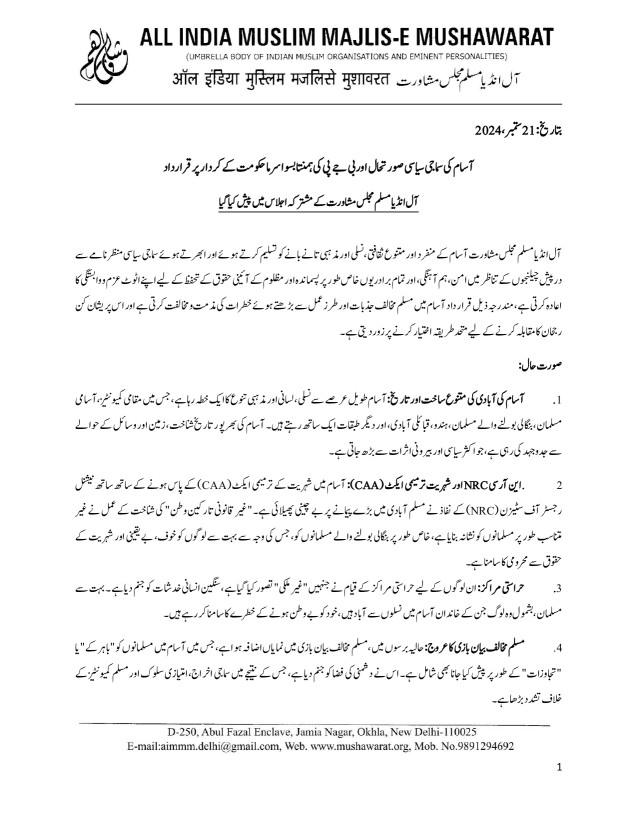
آل انڈیا مسلم مجلسمشاورت کے مشترکہ اجلاس میں پیش کیا گیا Date: 21st September, 2024 آل انڈیا مسلم مجلس مشاورت آسام کے منفرد اور متنوع ثقافتی، نسلی اور مذہبی تانے بانے کو تسلیم کرتے ہوئے اور ابھرتے ہوئے سماجی سیاسی منظر نامے سے درپیش چیلنجوں کے تناظر میں امن، ہم آہنگی، اور تمام برادریوں خاص طور پر پسماندہ اور مظلوم کے آئینی حقوق کے تحفظ کے لیے اپنے اٹوٹ عزم و وابستگی کا اعادہ کرتی ہے، مندرجہ ذیل قرار داد آسام میں مسلم مخالف جذبات اور طرز عمل سے بڑھتے ہوئے خطرات کی مذمت و مخالفت کرتی ہے اور اس پریشان کن رجحان کا مقابلہ کرنے کے لیے متحد طریقہ اختیار کرنے پر زور دیتی ہے۔ صورت حال: 1. آسام کی آبادی کی متنوع ساخت اور تاریخ: آسام طویل عرصے سے نسلی، لسانی اور مذہبی تنوع کا ایک خطہ رہا ہے، جس میں مقامی کمیونٹیز، آسامی مسلمان، بنگالی بولنے والے مسلمان، ہندو، قبائلی آبادی، اور دیگر طبقات ایک ساتھ رہتے ہیں۔ آسام کی بھرپور تاریخ شناخت، زمین اور وسائل کے حوالے سے جدوجہد کی رہی ہے، جو اکثر سیاسی اور بیرونی اثرات سے بڑھ جاتی ہے۔ .این آرسی NRC اور شہریت ترمیمی ایکٹ (CAA): آسام میں شہریت کے ترمیمی ایکٹ (CAA) کے پاس ہونے کے ساتھ ساتھ نیشنل رجسٹر آف سٹیزن (NRC) کے نفاذ نے مسلم آبادی میں بڑے پیمانے پر بے چینی پھیلائی ہے۔ “غیر قانونی تارکین وطن” کی شناخت کے عمل نے غیر متناسب طور پر مسلمانوں کو نشانہ بنایا ہے، خاص طور پر بنگالی بولنے والے مسلمانوں کو، جس کی وجہ سے بہت سے لوگوں کو خوف، بے یقینی اور شہریت کے حقوق سے محرومی کا سامنا ہے۔ حراستی مراکز: ان لوگوں کے لیے حراستی مراکز کے قیام نے جنہیں “غیر ملکی” تصور کیا گیا ہے، سنگین انسانی خدشات کو جنم دیا ہے۔ بہت سے مسلمان، بشمول وہ لوگ جن کے خاندان آسام میں نسلوں سے آباد ہیں، خود کو بے وطن ہونے کے خطرے کا سامنا کر رہے ہیں۔ مسلم مخالف بیان بازی کا عروج: حالیہ برسوں میں، مسلم مخالف بیان بازی میں نمایاں اضافہ ہوا ہے، جس میں آسام میں مسلمانوں کو “باہر کے” یا “تجاوزات” کے طور پر پیش کیا جانا بھی شامل ہے۔ اس نے دشمنی کی فضا کو جنم دیا فرقہ وارانہ تشدد اور امتیازی سلوک: پورے آسام میں مسلمانوں کے خلاف فرقہ وارانہ تشدد، املاک کی تباہی اور سماجی بائیکاٹ کے واقعات رپورٹ ہوئے ہیں۔ ملازمت، تعلیم، اور سرکاری اسکیموں تک رسائی میں امتیازی سلوک مسلمانوں کو مزید پسماندہ کر تا ہے، جس سے سماجی و اقتصادی تقسیم مزید گہری ہو تی ہے۔ اقتدار سے مسلمانوں کا اخراج: آسام کے سیاسی منظر نامے میں مسلمانوں کی نمائندگی میں کمی آئی ہے، اور کمیونٹی اکثر خود کو فیصلہ سازی کے عمل سے الگ پاتی ہے جو ان کی زندگیوں کو براہ راست متاثر کرتی ہے۔ اس سیاسی پسماندگی سے مسلم آبادی میں بے اختیاری اور ناراضگی کے احساس میں اضافہ ہوا ہے۔ تجاویز: 1. امتیازی سلوک کی مذمت: آل انڈیا مسلم مجلس مشاورت آسام یا ہندوستان کے کسی بھی حصے میں مسلمانوں کو نشانہ بنانے والے کسی بھی قسم کے امتیازی سلوک، تشدد یا ایذا رسانی کی شدید مذمت کرتی ہے۔ یہ مرکزی اور ریاستی حکومتوں سے مطالبہ کرتی ہے کہ وہ مذہبی یا نسلی پس منظر سے قطع نظر تمام شہریوں کے لیے مساوات، سیکولرازم اور انصاف کی آئینی اقدار کو برقرار رکھیں۔ 2.این آر سی NRC اور CAA خدشات کا فوری ازالہ: حکومت کو NRC اور CAA کے عمل سے متعلق جائز خدشات کو فوری طور پر دور کرنا چاہیے۔ یہ اجلاس شہریت کے تعین میں امتیازی طرز عمل کے خاتمے کا مطالبہ کرتا ہے اور لوگوں کی شہریت کی حیثیت سے متعلق تمام معاملات کے لیے ایک منصفانہ، شفاف اور غیر جانبدارانہ حل پر زور دیتا ہے، اس بات کو یقینی بنانے پرزور دیتا ہے کہ کسی فرد کو غیر منصفانہ طور پر بے وطن یا قید نہ کیا جائے۔ 3. حراستی مراکز کا خاتمہ: ہم آسام میں حراستی مراکز کو فوری طور پر بند کرنے کا مطالبہ کرتے ہیں۔ بغیر کسی واضح اور معقول وجہ کے افراد کو حراست میں لینا بنیادی انسانی حقوق کی خلاف ورزی ہے۔ ریاست کو متاثرہ افراد کی بحالی اور قانونی مدد فراہم کرنے کے لیے کام کرنا چاہیے۔ 4. نفرت انگیز تقاریر اور تشدد سے تحفظ: یہ اجلاس مسلم مخالف بیان بازی اور نفرت انگیز تقاریر کے عروج پرسخت تشویش کا اظہار کرتا اور چاہتا ہے سخت قانونی کارروائی کے ساتھ اس کا مقابلہ کیا جانا چاہیے۔ حکومت، سول سوسائٹی کے ساتھ مل کر، بین فرقہ وارانہ ہم آہنگی کو فروغ دینے اور مذہب کی بنیاد پر تشدد یا امتیازی سلوک کے واقعات سے نمٹنے کے لیے فعال اقدامات کرے۔ 5. سیاسی بااختیاریت اور نمائندگی: اس بات کو یقینی بنانے کے لیے کوششیں کی جانی چاہئیں کہ آسام کے مسلمانوں کو حکمرانی کے تمام سطحوں پر سیاسی طور پر نمائندگی دی جائے۔ کسی بھی کمیونٹی کو سیاسی عمل سے باہر رکھنا جمہوریت کو کمزور کرتا ہے۔ تمام سیاسی جماعتوں سے اپیل کی جاتی ہے کہ وہ اپنے پلیٹ فارمز اور پالیسی سازی میں مسلم آوازوں کے ساتھ جڑیں اور ان کو شامل کریں۔ 6. سماجی اقتصادی ترقی: آسام میں مسلمانوں کو درپیش سماجی و اقتصادی تفاوتوں کو دور کرنا انصاف اور مساوات کے حصول کے لیے اہم ہے۔ ہم حکومت سے مطالبہ کرتے ہیں کہ وہ تعلیم، صحت کی دیکھ بھال، روزگار، اور پسماندہ مسلمانوں کے لیے زمین کے حقوق میں مثبت پالیسیوں کو نافذ کرے، ریاست کی ترقی میں ان کی مکمل شرکت کو یقینی بنائے۔ مکالمہ اور مفاہمت: بداعتمادی اور غلط فہمی کے خلا کو ختم کرنے کے لیے سول سوسائٹی کی تنظیموں، مذہبی رہنماؤں اور سیاسی اداکاروں کی مدد سے مختلف کمیونٹیز کے درمیان مسلسل بات چیت کا عمل ضروری ہے۔ آل انڈیا مسلم مجلس مشاورت اس طرح کے مکالمے کے لیے پلیٹ فارم بنانے کی کوششوں کی حمایت کرتی ہے جس کا مقصد باہمی احترام اور پرامن بقائے باہمی کو فروغ دینا ہے۔ قانونی اور انسانی امداد: این آرسی NRC سے غلط اخراج کے متاثرین اور حراست یا بے وطنی کا سامنا کرنے
Resolution on the Sociopolitical Situation in Assam and BJP’s Himanta Biswa Sarma’s Govt role
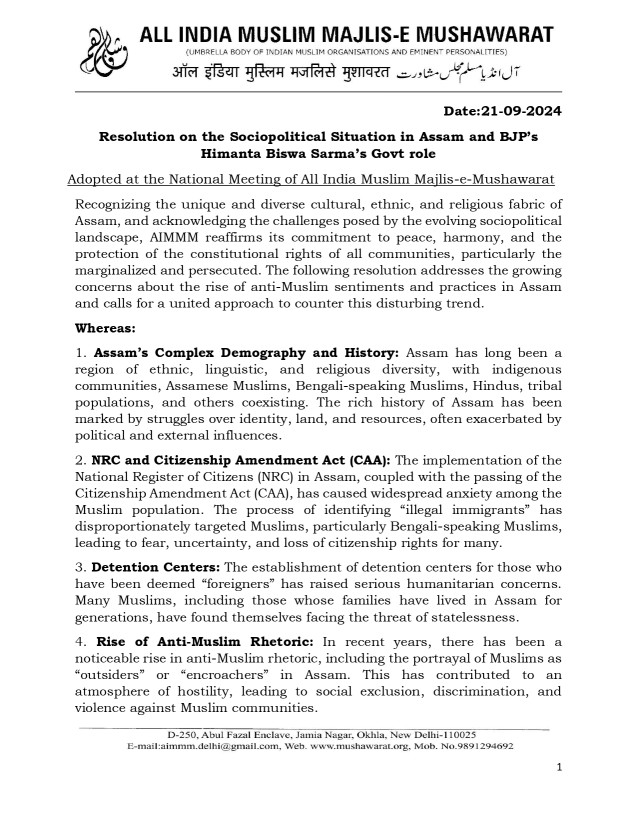
Adopted at the National Meeting of All India Muslim Majlis-e-Mushawarat Date: 21st September, 2024 Recognizing the unique and diverse cultural, ethnic, and religious fabric of Assam, and acknowledging the challenges posed by the evolving sociopolitical landscape, AIMMM reaffirms its commitment to peace, harmony, and the protection of the constitutional rights of all communities, particularly the marginalized and persecuted. The following resolution addresses the growing concerns about the rise of anti-Muslim sentiments and practices in Assam and calls for a united approach to counter this disturbing trend. Whereas: 1. Assam’s Complex Demography and History: Assam has long been a region of ethnic, linguistic, and religious diversity, with indigenous communities, Assamese Muslims, Bengali-speaking Muslims, Hindus, tribal populations, and others coexisting. The rich history of Assam has been marked by struggles over identity, land, and resources, often exacerbated by political and external influences. 2. NRC and Citizenship Amendment Act (CAA): The implementation of the National Register of Citizens (NRC) in Assam, coupled with the passing of the Citizenship Amendment Act (CAA), has caused widespread anxiety among the Muslim population. The process of identifying “illegal immigrants” has disproportionately targeted Muslims, particularly Bengali-speaking Muslims, leading to fear, uncertainty, and loss of citizenship rights for many. 3. Detention Centers: The establishment of detention centers for those who have been deemed “foreigners” has raised serious humanitarian concerns. Many Muslims, including those whose families have lived in Assam for generations, have found themselves facing the threat of statelessness. 4. Rise of Anti-Muslim Rhetoric: In recent years, there has been a noticeable rise in anti-Muslim rhetoric, including the portrayal of Muslims as “outsiders” or “encroachers” in Assam. This has contributed to an atmosphere of hostility, leading to social exclusion, discrimination, and violence against Muslim communities. 5. Communal Violence and Discrimination: Instances of communal violence, property destruction, and social boycotts against Muslims have been reported across Assam. Discriminatory practices in employment, education, and access to government schemes further marginalize Muslims, deepening the socioeconomic divide. 6. Exclusion of Muslims from Political Power: Muslim representation in Assam’s political landscape has declined, and the community often finds itself alienated from decision-making processes that directly affect their lives. This political marginalization contributes to a sense of disempowerment and fuels resentment among the Muslim population. Resolved: 1. Condemnation of Discrimination: The All India Muslim Majlis-e-Mushawarat strongly condemns any form of discrimination, violence, or harassment targeting Muslims in Assam or any part of India. It calls upon the central and state governments to uphold the constitutional values of equality, secularism, and justice for all citizens, irrespective of their religious or ethnic background. 2. Immediate Redressal of NRC and CAA Concerns: The government must urgently address the legitimate concerns surrounding the NRC and CAA processes. This body demands the cessation of discriminatory practices in determining citizenship and urges a fair, transparent, and non-biased resolution to all cases involving people’s citizenship status, ensuring no individual is unjustly rendered stateless or incarcerated. 3. Closure of Detention Centers: We call for the immediate closure of detention centers in Assam. The detention of individuals without a clear and justifiable cause is a violation of basic human rights. The state must work to rehabilitate and provide legal support to those affected. 4. Protection from Hate Speech and Violence: The rise of anti-Muslim rhetoric and hate speech must be countered with strict legal action. The government, along with civil society, should take proactive steps to foster inter-communal harmony and address any incidents of violence or discrimination based on religion. 5. Political Empowerment and Representation: Efforts must be made to ensure that Muslims in Assam are politically represented at all levels of governance. The exclusion of any community from political processes weakens democracy. All political parties are urged to engage with and include Muslim voices in their platforms and policymaking. 6. Socioeconomic Development: Addressing the socioeconomic disparities faced by Muslims in Assam is critical to achieving justice and equality. We call on the government to implement affirmative policies in education, healthcare, employment, and land rights for marginalized Muslims, ensuring their full participation in the state’s growth. 7. Dialogue and Reconciliation: A process of continuous dialogue between different communities, facilitated by civil society organizations, religious leaders, and political actors, is necessary to bridge gaps of mistrust and misunderstanding. The All India Muslim Majlis-e-Mushawarat supports efforts to create platforms for such dialogues aimed at fostering mutual respect and peaceful coexistence. 8. Legal and Humanitarian Aid: Legal aid must be provided to those affected by wrongful exclusions from the NRC and those facing detention or statelessness. Humanitarian support, including food, shelter, and healthcare, should be extended to the victims of state repression and violence in Assam. Conclusion: The All India Muslim Majlis-e-Mushawarat reaffirms its commitment to advocating for the rights, dignity, and safety of Muslims in Assam and across India. We condemned Hemanta Wiswa Sarma’s led BJP government’s discriminatory and divisive policies and anti-Muslim statements of the CM. In solidarity with all marginalized communities, we stand against oppression, discrimination, and injustice, striving for a nation where every citizen is treated with respect and fairness, in accordance with the principles of the Indian Constitution. — Place: New Delhi
